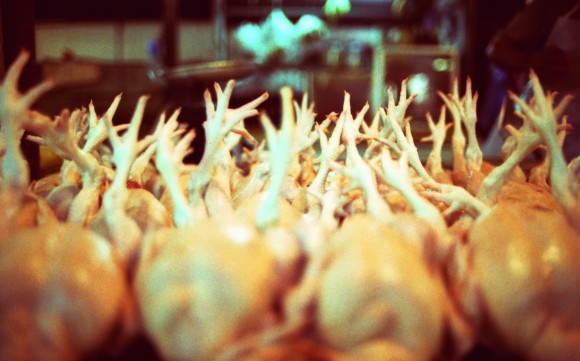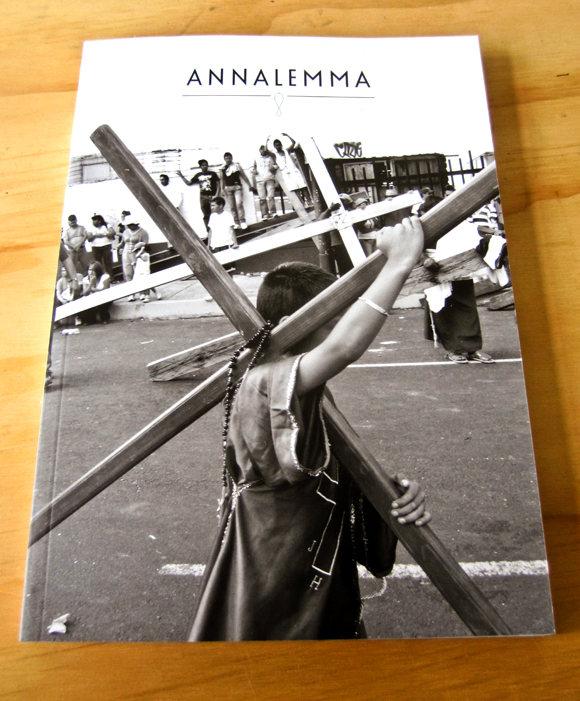In 2004, after six years of menial kitchen apprentice work, I began to help run a busy restaurant. Under its roof, in my four years there, I’m sure chunks of my life were depleted by the stress, labor, alcohol consumed, and brushes with death by the hands of the Mexican line cooks. The main source of the stress was the owner of the restaurant, who kept those life-draining spouts flowing at all times.
His name was Jamie. He looked like a warthog with pockmarks, hair plugs, and the sort of trimmed goatee fitted for dickheads. Don’t let those generalizations fool you: I believe, all those traits and an overbearing presence stripped away, he was a good man. In his twenties, he worked as a short-order cook who parlayed his knowledge of the industry into opening his own bar and grill. His consumption of alcohol stretched his attention to business detail too thin and forced him into bankruptcy, shutting the doors of his bar. Years later, sobriety found him readied and focused to open a new restaurant. After this re-birth, he opened four more locations in the Chicagoland area. I came aboard for the last three and rode the cresting business until the doors were closed and opened to new owners.
Once the construction of his newest, biggest, and soon-to-be most lucrative business was underway, after fifteen years of sobriety, he regained his lost stride with alcohol, stating “I feel comfortable enough to start drinking again.” The aforementioned characterizations of my boss were the way I viewed him while he was sober. Addictions intact, he was a brutal personality that only sought his own end — namely: money for gambling, booze, and cocaine.
In the thick of a dinner rush, the kitchen’s rhythm was stilted momentarily by a server’s ineptitude. Jamie strolled in with a pint in hand, directing his attention to the waitress, pulling her away from the argument between the cooks and herself. Still in plain view of the entire kitchen staff, he sought her side of the issue, assessed it, and informed her she was wrong. Offering an attitude-laden response to the owner’s assessment, Jamie rebutted, “Don’t be mad because you’re fat.”
Possession of a horrible, cutthroat demeanor when irritated didn’t win over too many people and really gained him a deserving reputation. Then, there were moments I noticed the core goodness in him.
As one of two white guys in a kitchen employed by roughly twenty Mexicans, I learned a lot about Latin culture. All of the cooks were living here in the states illegally. During business downtime, they would tell me about life in Mexico City, Zacatecas, and Jalisco. I learned that some of them made it across the US-MEXICO border on their own. The majority took the surprisingly less dangerous option, paying to be smuggled into America. Voluntary human smuggling cost them up to $5,000. Earning that kind of money didn’t come easily in a country where an employee working for minimum wage earns thirteen times less than a minimum wage worker in the United States.
When I was working the kitchen for the bar crowd one night, the back door of the restaurant opened. Chilo, our fry station grunt who’d left for Mexico City a month back, appeared with the sort of filth accumulated without a pause in travel. Behind him walked a Mexican woman who looked like she was fifty years old, but, in all likelihood, was in her early thirties. I noticed she wasn’t wearing any shoes and her feet were caked with cracked soot. Before asking me where Jamie was, Chilo pointed at the woman and asked me if she could wash up in the sink we thawed meats out in.
I found Jamie in the bar and walked back to the kitchen with him to find four other Mexicans huddling over the large sink, washing the harried travel off of themselves, leaving a dirty pool underneath them. I went outside to see what sort of caravan they’d arrived in and saw a Chevy Suburban. At the wheel was a menacing driver who remained motionless, staring straight ahead as if controlled by someone asleep at the remote. This was one of the “coyotes” the guys had told me about. They’d also told me that these people were killers.
Chilo had joined the illegal migration without any initial money down, promising the coyote his boss would pay his 2,000 dollar travel fee once they’d arrived at the restaurant. Chilo exited the office clutching the same envelope that usually held our week’s pay. Jamie had ponied up, probably saving Chilo’s life in the process.
The regard held for him by his cooks bordered on the sort of allegiance pledged to a dictator who took care of the soldiers providing the shield surrounding his dominance. If Jaime had a right hand man, it was Jimmy.
Best described as savage, Jimmy wielded his bulk proudly. Rumored to be a one-time user of steroids, it showed in his bulk and abnormal muscle. Carrying the sort of presence that assured you most of the rumors about him were true, he was one of the scariest people I’ve ever come across. Before I’d worked alongside him, other cooks spun the kind of tales about him that you might hear about crazed warriors.
For 75 days straight, he worked twelve-hour shifts without signaling or appearing to be fatigued. Sociopathic boasts about fleeing to Mexico in order to escape an indictment for murder. Three months after meeting him, I witnessed him stab another line cook in front of me. The reason? He wasn’t making a pasta sauce fast enough. Sliced him clean through the chef pants, leaving a nice gushing thigh wound. Still, displaying the will to carve someone up wasn’t the defining moment that told me Jimmy was devoid of humanity.
There was a server there named “Flip,” who was Big Bird incarnate. Everything about her was grating. She latched onto Jimmy for the same reason Jamie kept him around: as an unwavering source of protection. Aggressive flirting between the two led, I’m sure, to disgusting fucking.
Heading out to my car after a 12-hour shift, I saw Jimmy inside Flip’s car, with Flip in the passenger seat. I watched with abject shock as Jimmy’s head lowered like a periscope and Flip seized upright with a jolt. She had also put in a 12-hour shift, and without a shower before Jimmy’s tongue painted her clitoris, her bodily fluids must have shot into his taste buds like a fishy 9-volt battery bullet. There are certain qualities a person presents that suggest whether or not they are sane. This scene unfolding in front of me dropped a permanent anchor on the arrow pointing toward INSANE for Jimmy. Jamie chose his henchmen the way despots did: wisely.
Any addict with years removed from their addiction knows full well the battle of trying to stay humble against wanting to equate the distance of being clean with some sort of victory. A victory most believe allows them the prize of a drink or a taste, because they’ve learned control. Shark-like, a woman named Colleen circled Jaime at the bar one night. She liked coke, so it followed that Jaime helped her procure it with his money, and followed that he started using it too. It only took him about a week to leave his wife of twenty years to begin living out of a hotel with Colleen.
Drunk and coked up, he was a master of claptrap and braggadocio. Posting up at the bar once my shift ended, he sidled up to me, dispensing with more talk of the future and state of his own union.
“Can you believe people are saying I’m using cocaine?”
From where I sat, as he stood, hovering over me, I could see a small rock of un-chopped coke lodged in his pulsing right nostril.
Jamie’s relationship with empty promises led to a lot of scumbag maneuvers and guilt-driven overcompensations always falling short of their intended mark. My check would bounce, he’d reimburse me out of the till, and then pay my bar tab on a night I’d run up a large bill, then bounce the liquor distribution check, take money out of the dry goods bill, and then disappear for three weeks.
His vanishing act was becoming rote enough to assume the worse for the fate of his business empire. Bizarrely, he would show up at 1-2 a.m., smash his fingers across the bar register keypad like a baby on a piano, opening the automated drawer, and essentially steal from himself, peeling all the bills out of their slots, pocketing them then making a fast shuffle back through the doors he entered five minutes prior.
When the levees broke due to the category 3 storm in New Orleans in 2005, our restaurant, like the rest of the non-governmental United States responded with charity. During the week the tragedy took place, we held a fundraiser, with proceeds going toward the people of Louisiana affected by the hurricane.
Inside a big cardboard box, not a safe, sat 30,000 dollars waiting to be deposited into rescue efforts the very next day. Inside five minutes, my boss barreled through the restaurant wearing the summer coat of slick narcotic abusers, a leather jacket, glanced his shoulder off the floor manager’s pausing body, and entered the office, where the charity earnings sat.
Watching him carry the entire box out of the office without so much as an impulse to stop him probably defines me as uncaring, but it evolved into criminal folly so fast it struck me as ridiculous. Before he left with the flood victim’s donations, he set the box down against the bar cooler, pulled out a Miller Lite, and took what looked to me like the most refreshing sip in the world.Then he winged the still full bottle at the head of the screaming manager. If not for the sheer depravity of the act, part of me wanted to really admire everything that had gone down. Most of the money was recovered the following morning after his daughter hunted him down.
Last I heard, Jaime sold all of his restaurants off and, as a ploy to evade bookies, debt collectors, and the IRS, adopted a mobile home as what he probably felt was temporary shelter, and may or may not have begun using crystal meth. Parts of New Orleans have never recovered, and still, I can’t help but feel horrible about laughing whenever I think about what I’d witnessed. Sometimes desperation pulls the worst out of an individual and plays out as a comedy to people who view moral corruption as something too absurd to filter through anything but humor. If I’m ever dying in the wake of a natural disaster, I expect someone to put on a show like Jaime for the idle amusement of a spectator. It’s all I can hope for, really.
Like the essay? Check out our print issue.
Read more about Joe here.
Read more about Sean here.





















